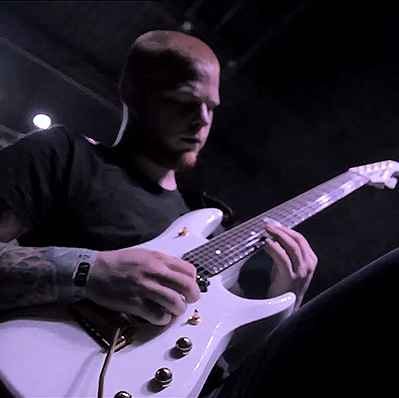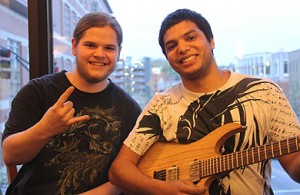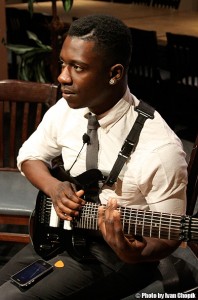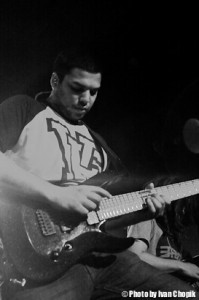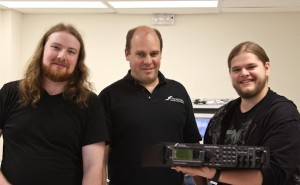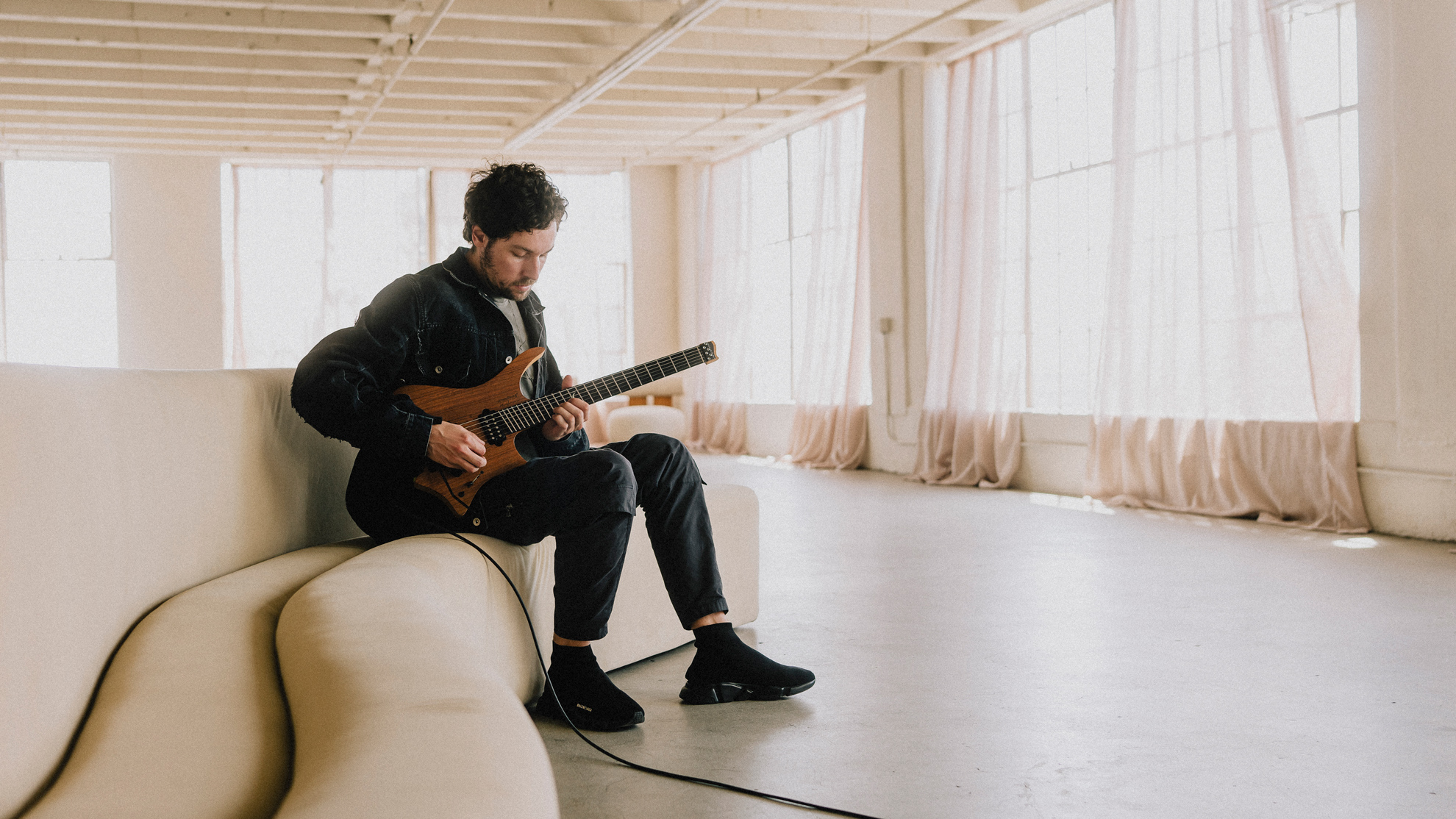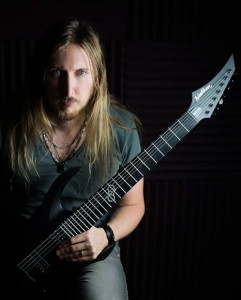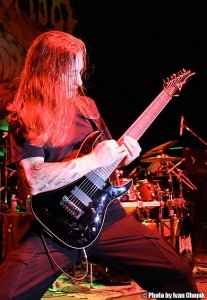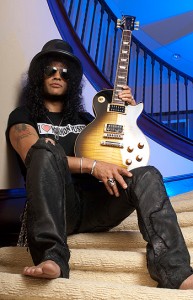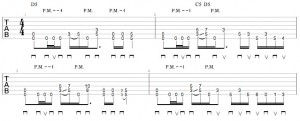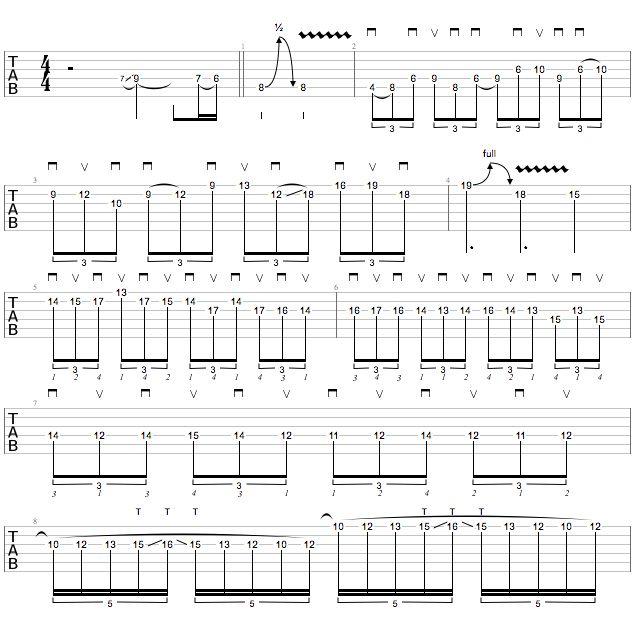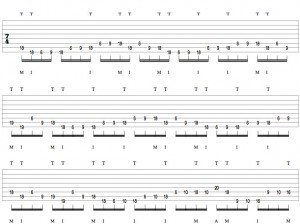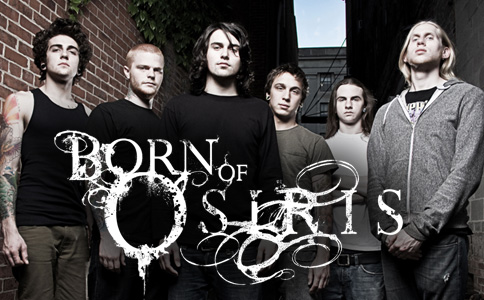 As those of you into the metal scene are probably aware, all the rage about Born Of Osiris’s new album turned their March release into quite the phenomenon. With a newly crafted sound including a bold electronic influence, newfound technicality and shred in the mix, The Discovery is something quite unique and experimental for the metal masses, leaving what makes up the rest of the deathcore scene seemingly in the dust.
As those of you into the metal scene are probably aware, all the rage about Born Of Osiris’s new album turned their March release into quite the phenomenon. With a newly crafted sound including a bold electronic influence, newfound technicality and shred in the mix, The Discovery is something quite unique and experimental for the metal masses, leaving what makes up the rest of the deathcore scene seemingly in the dust.
I had the opportunity to sit down with guitarists Lee McKinney and Jason Richardson before their performance at the Metal & Hardcore Festival in Worcester, MA and pick their brains about what has been going on in their world the past few months. We discussed the writing/recording process for The Discovery, fusing their metal and electronic influences, working with Casey and Misha on their demo, what entails a typical BOO practice regimen, and other fun stuff:
AG: You guys released your album in March – The Discovery. How do you feel about your success so far?
LM: Really good. I think it’s cool because, the second album, when we put it out, we were obviously really excited about it and we started playing it live and sometimes it would go better than others, but with this new album is consistently getting a great crowd response, good feedback, and it’s cool because I think that some nights the new material is going over better than older material, which is hard to have happen.
AG: You guys really have an original way of fusing the electronic influence to the metal influence and I’m really curious – what sort of electronic artists you like?
LM: I don’t know if we’re the best two people to ask about that.
AG: Ah, yeah because your synth player I’m sure is the guy to ask that.
LM: Our keyboard player Joe [Buras] is into a lot of different styles of music and he writes a lot of different styles of music at home too, aside from the band. But he listens to anything from straight electronic music, to dubstep, to hip hop… We’re not the kind of metal band that’s all just about metal all the time so I think it kinda shows from time to time in our music especially with the synth stuff.
JR: One of the dubstep artists that they listen to a lot, Cameron [Losch, Drums] and Joe, is this guy called NitGrit.
CLICK PLAY ABOVE TO VIEW THE INTERVIEW VIDEO
AG: I’m starting to really see a connection between metalheads and electronic fans. It’s really fusing and it’s doing you guys a lot of good.
LM: Yeah, we think so. There’s a certain death metal group of kids that enjoy our music, and sometimes they think it’s overdone, you know? But we’re not trying to be a death metal band or any certain thing, you know we just kind of do it how we want to do it.
AG: Does [Joe] do a lot of the production-based stuff or is he mostly composition based? Does he actually create the sounds and the sound design stuff?
JR: Honestly, whenever a song gets written it’s kind of like that person wrote the whole song, that’s usually how it goes. Like if Cameron wrote a song, he wrote almost every part to it, if Lee wrote a song he wrote almost every part to it. Same with me, I would write almost every part to it…
LM: I’m not a keyboard player, so when I create a song or when I create something I like, I take it to Joe or to Cameron, and just say ‘do what you do,’ because I feel like I can make a keyboard line, but when it comes to real big chords and stuff in my parts, I like leaving that up to them. It’s interesting, another song I did, ‘Two Worlds of Design,’ it wasn’t until like the last week of the album being mixed and mastered that Cameron actually put this keyboard part over the beginning and I thought it totally woke the part up a lot.
JR: Yeah, it made the song completely different, it’s so sick.
LM: It’s interesting, every song has its own story of how it came to be created, but we all have a little bit to do with it as far as the production of the keyboards. Programs like Omnisphere and stuff like that have really opened up our being able to be more experimental with that kind of stuff. I think that people hopefully will find that the keyboard tones on the album are a little bit more experimental than the previous ones.
AG: Absolutely! I feel like you guys have really incorporated the synth element as a really core part of your music as opposed to [just making it] an intro, or an ambience to the metal parts. I’m surprised to hear that you guys each write full songs [individually], because your music still at the same time feels very cohesive to me. So maybe you guys are just very similar influence wise.
JR: We feed off each other all the time. Like me, before I was in the band, the band was one of my favorite bands, and then I joined.
LM: He was the perfect person to join the band and obviously aside from ridiculous guitar playing, it was cool to have someone from an outside point of view that has looked at the band from that point of view for a long time.
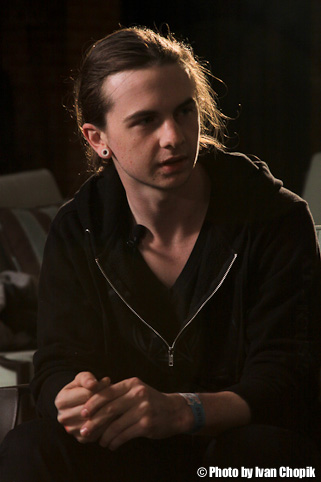
Jason Richardson
For us being in the band sometimes you get so wrapped up in what you’re doing that you’re not seeing the whole big picture from the outside, you’re just seeing your personal tastes and things on the inside, if that makes sense. So aside from just being the perfect person to play music with us, it’s cool to have that outside opinion on everything – not that it’s outside anymore [laughs]
JR: It’s been like well over a year. [laughs]
LM: But he definitely came in and said ‘Yo, this is what’s up!’ [laughs]
AG: That’s awesome. I’ve definitely heard a lot more technicality and ‘shred’ (to be kind of obvious) on this album. [To Jason] Is that sort of coming from your influence? You obviously both have improved your chops like crazy and really pushed yourselves.
LM: Well he’s improved mine as far as shred and stuff goes. That was one thing he wanted to do.
JR: Making him practice and shit.
LM: It was a lot of metronome work with some of the faster sweep things that he’s thrown into songs. The best way for me to get it was just metronome practice every day, and I’ve never had to do that before, because before it was just Cameron and I writing songs and he’s the drummer, so while he can play the guitar, he plays with two fingers and things that he wrote weren’t challenging for me and the things that I wrote obviously I could handle. So it’s definitely sweet – one thing he wanted to do was up the shred in the band and I think you know, it could never hurt.
JR: I think it helped a bit. [laughs]
AG: It’s added a completely new element. One of the things I liked about you guys in The New Reign was that all of your solos were very simple, but at the same time I felt very fitting.
JR: Yeah, they fit the chords really well.
LM: It wasn’t like a speedfest or anything.
JR: It wasn’t over the top, crazy or anything, but catchy. It got stuck in your head.
AG: Yeah, exactly. But at the same time this new element has really added a lot to your music, as opposed to just being wankery or anything like that.
LM: Aside from even, just general chops, songwriting has been pushed because now I have it in my head, if I’m doing something there should be some more shred in it, and that’s not something I used to think about as much, but now it’s definitely on my mind a lot more. Especially with the song ‘Recreate’ – I think that was one of the first songs that I’d really done that I thought about guitar leads a lot more and stuff like that.
JR: There were like 7 different versions of that song before it was done.
LM: It’s like a year in the making for that one. I wrote it and then re-wrote it, and re-did it and then I went to Misha’s and then re-did it, and it was just crazy.
AG: How do you guys write? Are you Guitar Pro fans?
JR: I am, like hardcore. I’m so sick of that program and I use it way too much.
LM: If he has a really long lead line, where it’s really fast and it’s just a bunch of notes, that’s about my extent with Guitar Pro – learning some of his faster stuff. Actually when Tosin Abasi was in our band for a little bit, Cameron and I had to do Guitar Pro tabs for him, and that’s shit’s hard. I don’t get it. [laughs] It would take the two of us, like three hours to put one two-minute song together for Tosin. We’re just terrible at it. [laughs]
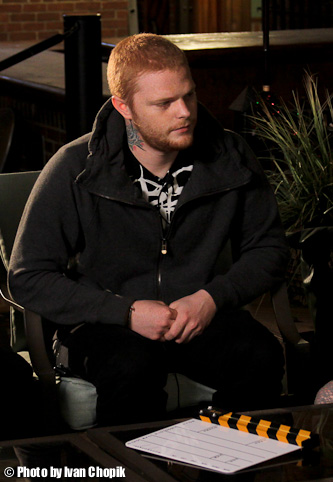
Lee McKinney
AG: That’s obscene. [laughs]
LM: I mean I think it’s amazing what [Jason] can do with that program.
JR: I wrote out all of ‘Behold’ and ‘XIV’ in Guitar Pro, every single instrument.
LM: For expression, it slows me down. That’s my problem with it, I suck at the program so for me to make it a creative outlet, it’s really hard. I have to write in Pro Tools because I have my guitar in hand, and my writing style fits with that. But, I want to get better at Guitar Pro, because I think it’d be cool to have both aspects to creating.
AG: Definitely. I don’t feel like I have the recording aspect down, so I can start writing a riff and then put it in Guitar Pro and kind of play with it and then I end up with a riff that’s kind of either really difficult or impossible to play…
JR: For sure, that’s what I like to do, write out something really crazy and then force myself to learn it and not really change it a lot because it sounds really sick. That’s how the end of ‘Behold’ was written, that very last solo. I wrote it out and it was like ‘Fuck. I have to learn this now.’ [laughs]
AG: What would you call a ‘Jason riff?’ How would you describe your style as far as riffage goes?
JR: Well, when I first started taking guitar seriously, I was like 12, 7th grade, somewhere around there, I liked Metallica hardcore, I got into them a lot. That was the first eight, nine months of my playing. Right around under a year I started taking lessons from this dude named Matt Mills, and right before I started taking lessons I got into Dream Theater hard, and I’ve pretty much just stuck with that ever since.
Jeff Loomis is sick, Stephan Forté from Adagio is really sick, too. All those shred guys, like the G3 with John Petrucci, Steve Vai and Gilbert – that year that was awesome. All those people I definitely take a lot of influence from. And my teacher Matt Mills, I have to name drop him, so people can check him out, he’s sick.
AG: I also heard that you attended the 5-week [Summer Performance Program] at Berklee College Of Music. How was that experience for you?
JR: It was really awesome, it was really fun going to the school. I mean if I wasn’t doing this, I’d probably be going there. I got accepted and I don’t remember how much of a scholarship, but I got a little bit, from going to the program. But, it’s all gone now, it’s been too long. [laughs] I’m not too bummed though, I’m really happy with where I’m at right now.
AG: Have both of you had some kind of musical education, classical or jazz wise?
JR: Yeah, I took classical lessons for a little while and some jazz stuff while I was at Berklee, and I’ve had a couple teachers.
LM: When I first started playing I did like 5 years of guitar lessons and it was everything, it wasn’t a particular study. As a matter of fact, the first couple years was like reading sheet music, and it’s weird because I feel like I was like ten, reading sheet music…
JR: I hate sight-reading so much.
LM: …and then all of a sudden, tabs are just exploding and then it’s just like, why did I learn all this shit? [laughs] I guess maybe one day, it could come in handy, in my whole life or something, I don’t know.
AG: Yea if for some reason you feel like playing a….
LM: Sitting in on a jazz session or something.
AG: …a wedding or some kind of event like that.
Jason: Yeah, you can make a lot of money doing that.
https://youtube.com/watch?v=H_rVQiywVw0
CLICK PLAY ABOVE TO VIEW THE RECREATE MUSIC VIDEO
AG: You’re playing metal, you guys are doing what you want, I wouldn’t worry about sight-reading. [laughs]
LM: Yeah, I don’t really incorporate too much theory into creating music. Obviously it is a part of it, but it’s not like I’m thinking theory, theory, theory, all the time.
AG: I think some people are really good at separating it – their sort of theory way of looking at things and then their [non-theoretical] approach to metal, but it’s difficult to balance, for sure.
LM: We just got off a tour with The Human Abstract, and I was playing a lot with AJ [Minette], the guitar player and he’s a classical professor. He was telling me how he writes his songs and it’s really interesting because he’ll say, ‘I want to do a song whole tone’ – he’ll just say this is what I’m doing and I’m going to do it the whole song.
I don’t think it affects their songwriting negatively. I think they write a lot of great songs and getting on tour with them was awesome. It was interesting to see that there are people out there that are setting guidelines and sticking to then for their creation process. I have more of a freestyle approach to it, like I said.
A lot of times I’ll start with a click track or a straightforward drum beat [gestures drum beat] and just start free styling for a few minutes, just jam and then listen back and then hear a piece that I like and start with that, and make the drums fit to it. It’s interesting to me to hear how other people write music, especially with Jason and Guitar Pro and just being awesome at that program. It’s just crazy to me.
AG: Do you guys write any riffs together or do you mostly write a lot of riffs alone and fuse them?
LM: Alone, for the most part.
JR: I mean sometimes, we’ll meet halfway on a song. Like the song ‘Regenerate,’ Cameron wrote, pretty much like the first two, three, minutes of and then that last piano breakdown half, I wrote.
LM: Actually, it’s the same with ‘Follow the Signs,’ now that I think of it. It was like half of the song I had, half of the song he had. The label in particular was like ‘Hey, we really like all these pieces.’ So one day we just put it all together.
AG: How long have you been sitting with these songs? Did you have everything written before you went to the studio?
JR: Some are a lot older than others. The song ‘Ascension,’ that was [written] like a week or two before we started tracking.
Lee: We’re always creating music. We’re the type of band that’s like ‘Oh we need to do an album now.’
Jason: …that’s hindering to the writing process, it’s stressful.
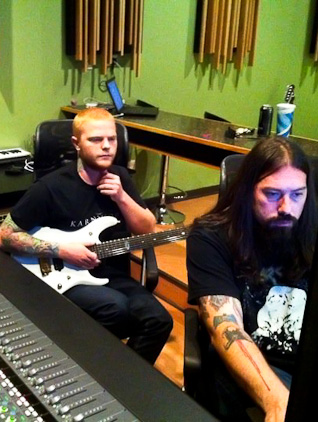
Lee in the studio with Don Byczynski
Lee: It comes from all places, all different random times. That’s how ‘Ascension’ ended coming up, a week before the studio. It just happens when it happens, you know? But as far as the studio goes, we do definitely show up with everything for the most part done, because we have a studio at our house – we all have a house and studio together, and we all have our own little personal recording setups and things like that.
When it comes time to record guitar parts, Jason kind of always seems to remember everything, but for me like I said, with more of a free style approach to songwriting sometimes I’ll create something in Pro Tools when I make it and then it’ll come studio time and I’ll only remember like one harmony and I’ll be like ‘What did I play for this? How did I do this?’
JR: That’s why Guitar Pro is sick!
LM: I just had my laptop and Pro Tools setup next to me when I was tracking to reference… But we do try to have everything done before the studio. Except, not all the lyrics were done.
JR: Most of the lyrics were written in the studio. Half the studio was dedicated to the lyric writing process and the other half was all tracking.
AG: Were you guys at all part of the lyrical concept or was that pretty much just the vocalists’ duty?
LM: Yea, not so much, we were there for a couple of songs.
JR: Mostly Ronnie [Canizaro] and Joe, but there are parts scattered throughout where we all had a little bit of input.
LM: Even more so we feel a little more connected to this [album] because our vocalist Ronnie and even Joe, being the writers of the lyrics and everything, they’d been experimenting and learning about all these crazy things about technology and the future, just anything. They’ve been really researching so much stuff just out of general interest.
I think it was cool, because it entered into the lyrics a little bit, which is neat because before when we were doing the The New Reign we were 17 years old – what can we say? What are we going to try to preach a bunch of life knowledge or something like that? So I feel like now that we’ve toured a few years and have become our own more, the lyrics and just every aspect of the band in general I guess has just stepped up.
Now that we have our band… it was a while where it was kind of just the five of us and guitar fill-ins, but this is the first time we’ve been a band writing as a band, and it’s awesome.
AG: I heard through the grapevine that Casey [Sabol, ex-Periphery vocalist] and Misha [Mansoor] from Periphery had collaborated with you guys on the teaser for The Discovery – the three song clips you guys released on your MySpace. They weren’t really credited on your album, they got a ‘Thank You,’ but did they actually help you out with the production? How did they collaborate?
LM: Only a few of us worked with Misha, we weren’t all there.
JR: It was only Ronnie and Joe that went with Casey and me, Cameron and Lee went to Misha to track the music.
LM: Those songs were supposed to be released before our old summer tour and they were going to be completely credited and everything because you know, they produced it and did everything. When it came to the album, they weren’t really there for that and we re-recorded the songs. It was brought up and they definitely helped us out but from what I was told, Casey had just a few ideas here and there, and it wasn’t like they were like part of the [writing] of the songs, or like Casey was part of a writing the vocals – the ideas were there.
JR: The majority of it was all done. Everything was there.
AG: Ah, so they didn’t really add much to the production ideas.
LM: Not too much.
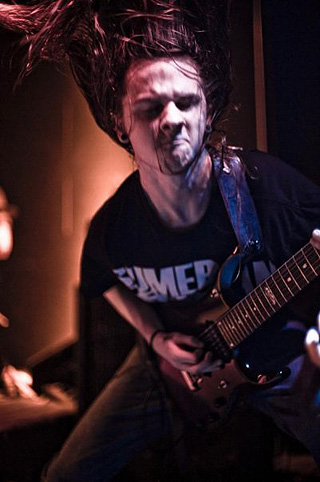
AG: Something I noticed about your new album was that the vocals are a lot more clear. You can really hear the lyrics as opposed to previous albums. I think that’s something Casey does a lot in his music, so I was wondering if that was something that actually…
LM: Yea he’s amazing.
JR: Yea he’s such a good musician, it’s insane.
LM: The clarity in the vocals was definitely one thing I remember Ronnie was talking about a lot. You know kids that make those YouTube videos, they like put their spin on the lyrics and they make it out to be like a joke.
AG: Oh really?
JR: Interpretations.
LM: They’re not making fun or anything, it’s just like funny vocal interpretations, and one thing Ronnie was talking about was, ‘I want people to understand every word I’m saying. I am screaming but I don’t want it to be like you need a book of lyrics to hear it.’ So they spent a lot of time on clarity.
AG: How do you guys practice before shows? Do you practice a lot together, do you practice certain techniques, do you have certain regimens before going into a show?
JR: Well before a set, I’ll usually just run through the set.
AG: So you’ll just play your own songs, you won’t go into other stuff.
JR: Well I’ll play other stuff too, I learned a bunch of other bands’ solos. I learned a lot of Petrucci’s solos and stuff like that, just to jam on and get warmed up because that stuff’s really intense.
LM: I do like some chromatic exercises and simple stuff that I had learned for just warming up fingers. I’ve picked up a couple Petrucci licks from him that I like to play a lot.
JR: Stretching’s always good, too.
LM: As far as band practice, before tours we’re kind of…not as good as we used to be at practice.
JR: We honestly don’t practice a whole lot before a tour. It’s only usually like 3 or 4 days maybe.
LM: We used to practice like, insane.
JR: Unless we need to learn a new song, like we were learning ‘Follow the Signs’ for instance, that was like a week or two probably. Everyone had to work on it on their own, Cameron had to go through and learn the drum parts, because we couldn’t sit down and just play it. We had to get like cohesive and everything.
LM: Sometimes when it comes to being on a tour we’re headlining, we have more options, we can play longer sets, but sometimes when you’re like second out of four on a tour, you only get like a half hour and then you have these songs that you kind of have to play, because kids always want to hear those certain songs. That’s when we don’t practice as much because we’ve been playing those songs for years.
AG: What are some of your favorite songs to play live from the new album?
JR: Probably ‘Devastate’, I like playing that one. Out of the new songs that we play live, that one definitely.
LM: I would say ‘Recreate’ for me, and we play ‘Follow the Signs,’ too which is a lot of fun. But I think the other two appeal to us a little more playing onstage.
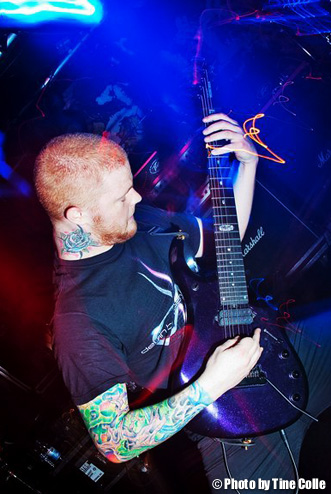 AG: Who would you say are some of your biggest influences on the album as far as metal bands or any artist?
AG: Who would you say are some of your biggest influences on the album as far as metal bands or any artist?
JR: Honestly, most of the material that I used for the album is like really, really old. Probably like two or three years old. Back from before I was even touring. I went over everything again for the album and spiced things up and made it my own again, because I progressed as a player obviously.
A lot of Dream Theater, I’ll just be honest. A ‘Follow the Signs’ part was kind of Soilwork influenced. You can kind of hear it, the keyboard line was originally a guitar part, but that was like too much of a blatant rip-off so we changed it. [laughs]
LM: I think for me as a guitar player Guthrie Govan has always been my favorite.
AG: Awesome, I’m a huge fan of Guthrie Govan.
LM: When it comes to guitar players I would never diss anyone but sometimes I feel like some albums you get shred for the sake of shred, but I feel like with Guthrie Govan, it’s tasteful. There’s so much feeling and emotion behind it.
AG: I kind of have like a goofy question, but you guys have one of the weirdest acronyms for your band: ‘BOO.’ Do you have a lot of weird jokes about that in your band?
JR: Eh, nah not really. [laughs]
LM: I just think it rules that we can’t really get Boo-ed.
JR: Yeah, that’s the sickest part.
LM: And I’ve heard it in the crowd and I do not know if they were boo-ing us or not, but you hear it from time to time and it’s like ‘Nice try’ or ‘thank you.’ [laughs] … I don’t think they really are boo-ing us, you never know, but it’s funny either way. Actually, on Halloween we had Halloween shirts with a ghost on it that said ‘Boo.’ Really corny, but a little fun way to play with the name, I guess.
JR: An even cornier shirt: I <3 my Boo.
LM: Oh yeah. We have fun with it.
AG: What would you say you dislike about the metal scene right now? A genre or a trend, anything like that?
JR: For me honestly, it’s just kind of becoming like a big blended mush of bands.
LM: I agree, completely.
JR: Honestly, I don’t even listen to a whole lot of metal anymore. It’s getting over-saturated with the same thing over and over and over again.
LM: You know sometimes, if you were to just press play on a CD and not show me who it was, and then play this CD… it’s really hard sometimes to tell like, ‘Oh that’s that band or that’s that band,’ because like I think there’s a group of bands that… a lot of our friends like Periphery, Veil of Maya, and After the Burial, I don’t really consider them part of that group… but there’s a lot of metal outside of it where it’s just, as Jason loves to say, ‘dissonant chord breakdowns.’ It’s ridiculous how much it is, I wish it was more about personality, but it’s not really.
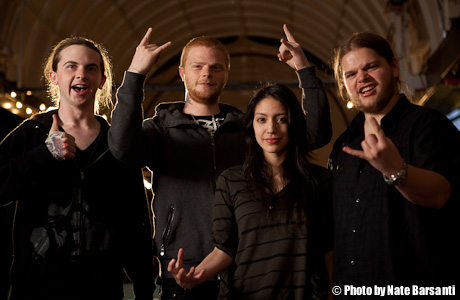
Jason Richardson, Lee McKinney, Annie Grunwald, Ivan Chopik
AG: What would you say to young musician trying to do what you guys are doing right now, promote themselves, and get themselves out there. How would you encourage them, and give them advice?
JR: Reply to ads you see for bands, because it works sometimes. That’s what I did.
LM: Bust out a metronome! Because [Jason] made me do it.
JR: Metronome definitely. Play stuff retarded-ly slow. Like quarter speed.
LM: What I’d say as far as writing goes, be unique and try to be original but… as we were just talking about, it kind of seems that there’s a cookie cutter formula to get your band big. “Do this, do this, do this, and kids will probably like it,” you know? It’s tough, but we think that maybe if we can keep our music as original as possible, that instead of quick hype, we’ll have longevity in the end. We’re not the judges of whether we will succeed at this point or not, but that’s what we’re aiming for.



